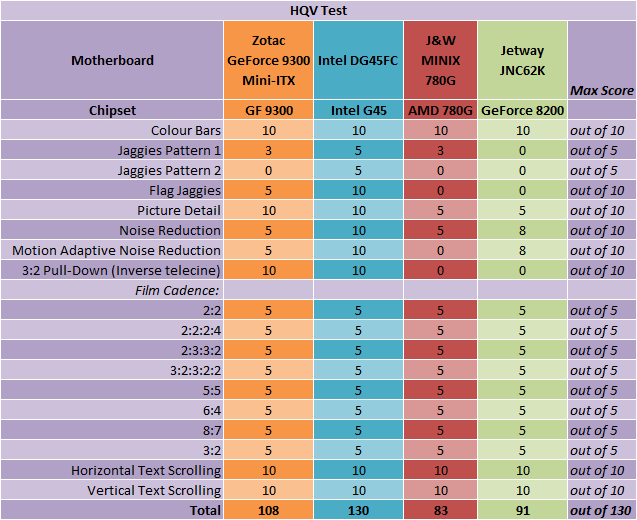HQV
Silicon Optix, makers of HQV, provides an industry standard benchmark for looking at video quality by providing tests the cover all areas of video processing playback: (motion adaptive) de-interlacing, noise reduction, 3:2 Pull-down detection (Inverse telecine), Film Cadence and Film Resolution manipulation.The tests are scored out of 130, where a score of 130 is considered "perfect."
We set the output at 1080p to test the video processing of the chipset, as opposed to the display. While we left the "performance settings" on auto, we did adjust the de-interlacing settings to find the best solution available from the drivers.

The first test showed the colour bars being displayed correctly without flicker, blur or banding and the gradient in the middle has a normal progression so full marks here.
Unfortunately in the next three tests, the Zotac GeForce 9300-ITX WiFi lost quite significantly to the Intel DG45FC with jaggies abundantly apparent in both Jaggies tests and also in the flag test. This was despite us playing with the settings in the Nvidia control panel and/or Cyberlink's internal PowerDVD 8 settings as well. The GeForce 9300 just doesn't do jaggie reduction, while Intel's ClearVideo is very effective at reducing this.
Noise reduction was also an issue and even with full noise reduction enabled in the Nvidia Control Panel, it was still noticeable in all the tests and cranking the slider all the way up and down didn't make a huge amount of difference. The rest of the tests were very good though, and the GeForce 9300 does provide a compelling HQV score, although not one that's perfect just yet.

MSI MPG Velox 100R Chassis Review
October 14 2021 | 15:04









Want to comment? Please log in.